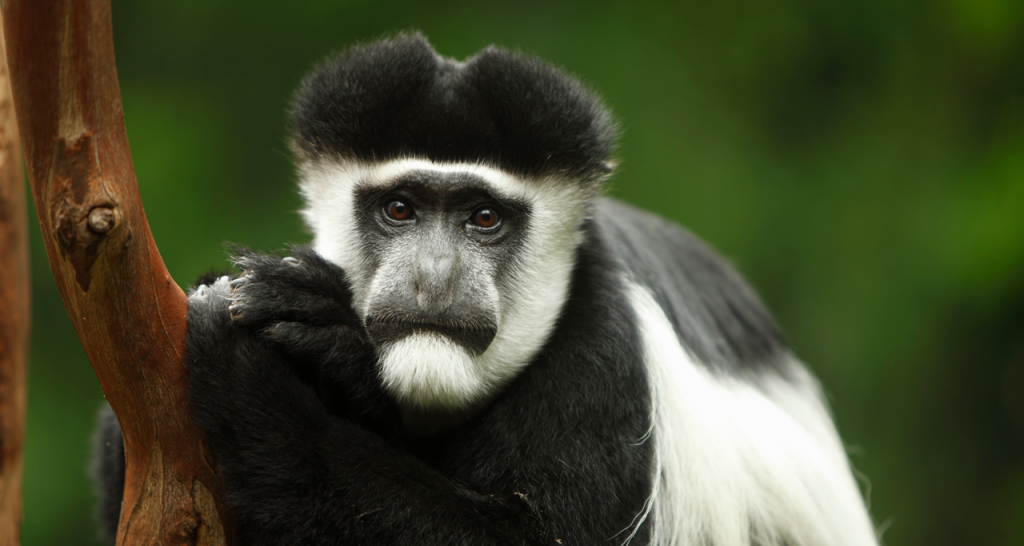By: Cynthia Macdonald
29 Aug, 2018

Evolution has equipped the colobus monkey with a unique digestive system
The human gut contains trillions of microbes. And in recent years, many of us have been excited by the idea that changing our diet to modify the makeup of our microbiomes might result in positive health effects.
But to what extent are we, and other animals, really able to alter what lurks within? That’s one of several questions emerging from a fascinating new study of primate microbiomes.
The global analysis of 18 types of non-human primates (including apes, monkeys and lemurs) concluded that anatomy likely plays a much larger role than diet in determining a given microbiome’s composition.
It’s the largest comparison of primate guts to date, and one that involved wild animals located in both the Old World (Africa and Asia) and the New World (the Americas).
Lead author Katherine Amato is an assistant professor of anthropology at Northwestern, and a CIFAR Azrieli Global Scholar. She has long studied the relationship between diet and gut microbiota in selective environments, paying special attention to the lessons wild primates might offer their human relatives.
Take the colobus monkey, for example. This herbivorous tree-dweller rarely touches the ground, preferring the sanctuary of forest branches. It’s geographically very widespread, found in both Africa and Asia.
“When we looked at the microbiomes of these monkeys on different continents,” says Amato, “they actually looked very similar to each other – despite living in different places, with different species of plants.”
One thing all colobus monkeys do have in common is a leafy diet. Fibrous and often toxic, leaves can be hard to digest. Amato says that evolution has equipped the colobus with a unique intestinal structure, which helps them tolerate their tricky diet. Accordingly, their intestines have become populated with similar microbes, which perform the valuable service of breaking down dietary compounds that might otherwise poison them.
When we looked at the microbiomes of these monkeys on different continents, they actually looked very similar to each other – despite living in different places, with different species of plants.
Their microbial signatures differ from those of other primates such as gorillas or howler monkeys. While they are also leaf-eaters, these species have developed their own particular physiological and anatomical responses to the diet.
According to Amato, primate microbiomes change as a result of “a kind of back and forth between diet and physiology.” In the wild, changes in a primate’s diet do shift it to a certain point: “but then you’d have to wait for a physiological change before the microbiome can change any farther.” That change is caused by evolution, which might take hundreds of thousands of years to go into effect.
In captivity, however, Amato notes that microbiomes do shift more rapidly. Zoo primates often contract gastrointestinal problems as a consequence of their changed diets: “there is something different, and not beneficial, going on in the microbiomes of captive individuals,” she says.
Naturally, this study has interesting implications for the examination of human microbiomes. Like zoo animals, most of us are long removed from the wild, and our diets have unquestionably been changed by the “captivity” of industrialization. But to what extent has this changed us – in terms of how we are built, and how we digest food?
“In the context of primates,” says Amato, “there is something that is very clearly a gorilla microbiome. There is very clearly a chimpanzee microbiome. Presumably there is also a human microbiome – but we need to learn how to delineate it. And to understand the processes that occur within that delineation.”
What matters is who you are, and how you’re built as an animal.
Studying humans is much more difficult than studying primates: geography, culture and lifestyle choices have all combined, over millennia, to provide us with different diets – and different microbiomes. Amato says that “my microbiome’s differing from my neighbour’s is probably a result of things like diet, or social interaction, or antibiotic use. But when you zoom out and look across a species, those things become kind of drowned out. What matters is who you are, and how you’re built as an animal.”
A global investigation of the human microbiome would no doubt be a complicated project. But this new study of humanity’s distant ancestors suggests it would be one that could pave the way to a new understanding of how internal microbes influence our collective well-being.
“These big evolutionary questions are important,” says Amato. “They have the potential to influence how we’re thinking about medicine, and how the microbiome affects human health.”